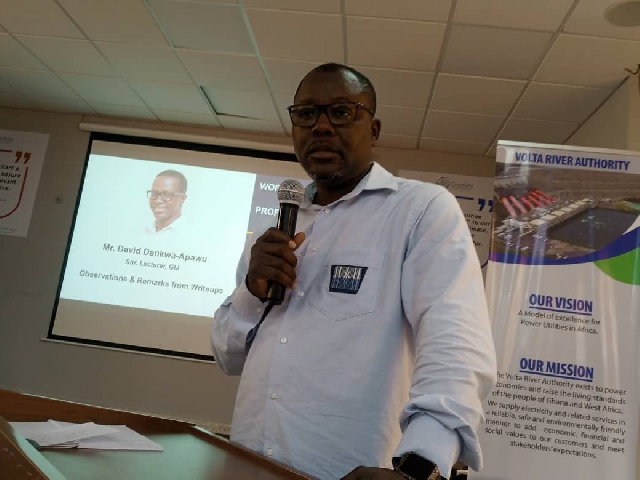Dr. Archibold Buah-Kwofie, Acting Director of the Nuclear Power Institute (NPI), has made a compelling case for Ghana’s urgent transition to nuclear energy, stressing its critical role in the country’s development trajectory and urging the media to play a central role in fast-tracking the process.
Speaking to media practitioners at a one-day stakeholder workshop organized by Nuclear Power Ghana (NPG), Dr. Buah-Kwofie stressed that Ghana’s development depends heavily on access to reliable and affordable electricity, adding that nuclear power is not just an option but a necessity.
Dr. Buah-Kwofie used global data to show a clear correlation between access to electricity and the Human Development Index (HDI), an index developed by the United Nations Development Programme (UNDP) to measure a country’s well-being beyond GDP.
“If you look at Africa, most countries are below 0.5 on the HDI scale. You see all the developed countries in deep blue are close to one,” he explained.
He further demonstrated that regions with better access to electricity and clean water tend to have higher human development, making the case that energy access is foundational to improving quality of life in Ghana and across the continent.
Why transition Nuclear?
Ghana’s current energy mix consists of about 68% thermal, 31% hydro, and just around 1% renewables. Dr. Buah-Kwofie warned that over-reliance on thermal sources makes the country vulnerable to fluctuations in global fuel prices.
“We need baseload in the electricity. We need affordable access to electricity to help us develop as a people,” he stated.
Nuclear power, according to him, offers a reliable, low-carbon solution that can secure Ghana’s energy future and support industrialization, hence the need for the transition.
Media partnership
In a passionate appeal to the media, Dr. Buah-Kwofie emphasized their role as shapers of public discourse and national priorities.
“There is nowhere in the world that a nuclear programme has partnered with the media like we’ve done in Ghana. You determine the conversations on our national airwaves and if you direct the conversation in the right channel, we’ll be able to make impact and fast-track some of the things that we need to do as a country,” he urged.
He stressed that the NPI is not seeking to influence media narratives but to empower journalists with accurate information.
Regulatory capacity
Dr. Buah-Kwofie also touched on the importance of regulatory readiness. He acknowledged that Ghana’s Nuclear Regulatory Authority (NRA) still has some way to go in building capacity to review and approve safety reports and environmental assessments.
“The project can do everything that they have to do, but if the regulator is not ready, we are not going anywhere,” he cautioned.
He revealed that the NRA recently underwent a peer review mission by the International Atomic Energy Agency and is now working on implementing the recommendations.
Dr. Buah-Kwofie encouraged the media and stakeholders to visit the E2 Centre—a state-of-the-art nuclear simulator—located at the Ghana Atomic Energy Commission to deepen their understanding of nuclear operations.
By Osumanu Al-Hassan/thenewsbulletin24.com


